Every creator on X (formerly Twitter) feels the same frustration:
“Why do some accounts explode with visibility while others tweet into the void?”
You may think it’s luck, verification badges, or posting frequency.
But no — the truth is far messier, far more mechanical, and far more strategic.
Under the hood, X’s ranking engine runs on 30–40 independent algorithmic modules — each evaluating your behavior, your audience, your content, and even your scrolling patterns. And now that Grok AI has taken a supervisory role, these signals are tighter and more reactive than ever.

Today, we’re breaking down the underground truths behind the X algorithm — the parts almost no one explains publicly.
Let’s get into it.
1. TweepCred: The Hidden Authority Score That Controls Your Reach
Most users don’t know this, but every single X account has an invisible authority score called TweepCred which is your account's overall "reputation score" or trust rating. Starts at -128 for new accounts; needs +17 minimum to appear in feeds. Calculated via historical behavior, content quality, and interactions. — originally engineered under Jack Dorsey.
Would you like to calculate your X reputation score now?
Here’s how it works:
• Every new account starts at –128.
Your posts effectively have zero reach until you climb out of the negative zone.

• You need at least +17 TweepCred to gain normal distribution.
Anything below that and your content is considered low-authority, meaning your impressions are throttled.
• Verified (Premium) accounts get an instant +100 boost.
This means they start at –28 instead of –128.
What affects your TweepCred?
Tweet language
Your bio
Your following/follower ratio
Your posting style
Account history
Engagement quality
Behavioral patterns (AI now evaluates tone)
TweepCred determines one thing:
Should X distribute your posts… or bury them? High Tweepcred (e.g., 50+) boosts distribution by 20-50x; low scores cause shadow-like throttling.
This is why you sometimes see tiny verified accounts outperform larger organic ones — they start closer to zero, while non-verified users must fight their way upward.
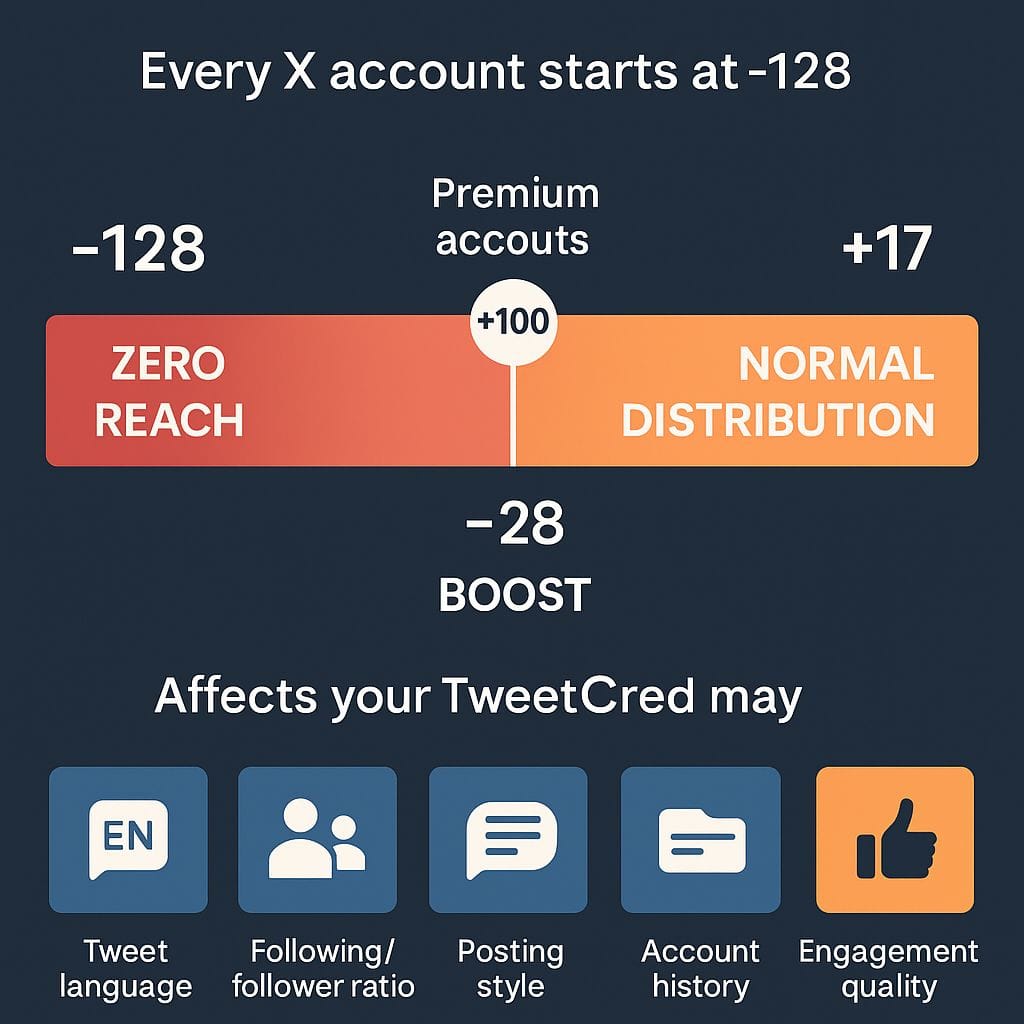
2. Shadow Hierarchy: The Invisible Karma System
Beyond TweepCred, X runs a deeper system referred to internally as a shadow hierarchy.
Think of it as your algorithmic karma.
If your account makes “low-quality moves” early in its life cycle — low engagement, spam patterns, trolling — the system remembers, and recovering from that damage becomes significantly harder.
The most dangerous mechanic here is Engagement Debt.
If your first 100 tweets have:
• Less than 0.5% engagement
• Too many scroll-passes
• Too few profile clicks
…your account is assigned permanent negative weightings.
In severe engagement debt, the system activates Cold Start Suppression:
Your posts are shown to only 10% of your usual initial distribution.
Example:
Normal visibility: 1,000 impressions in 10 minutes
Cold Start Suppression: 100 impressions in 10 minutes

To recover, your content must earn extraordinary engagement from that tiny sample — a nearly impossible cycle for new users.
This is why many promising new accounts “never take off.”
It’s not their content.
It’s their debt.
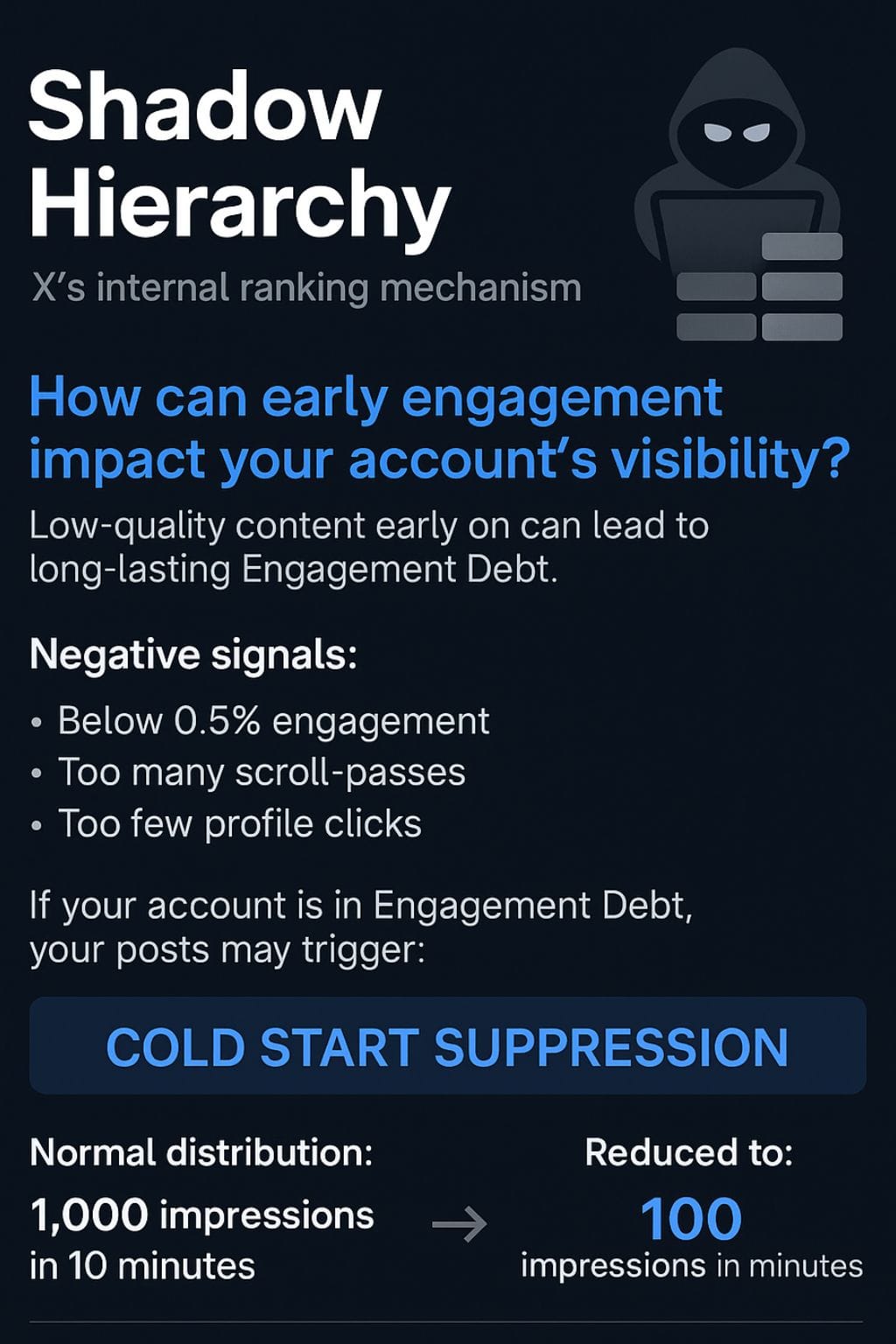
3. Duplicate Content Detection: The Spam Chain Killer
X also runs a machine-learning model informally known as the
Duplicate Content Detector.
Its job?
Detect posts that are:
• AI-generated
• Template-based
• Recycled
• Shared across groups
• Overlapping in style or structure
If your post resembles a cluster of similar content, the system flags your tweet as part of a spam chain, penalizing:
• You
• Everyone in that chain
• Posts that resemble yours in the future
Verified or Premium accounts receive a 30% penalty reduction, which is why low-quality verified accounts sometimes still get visibility while regular users collapse under penalties.
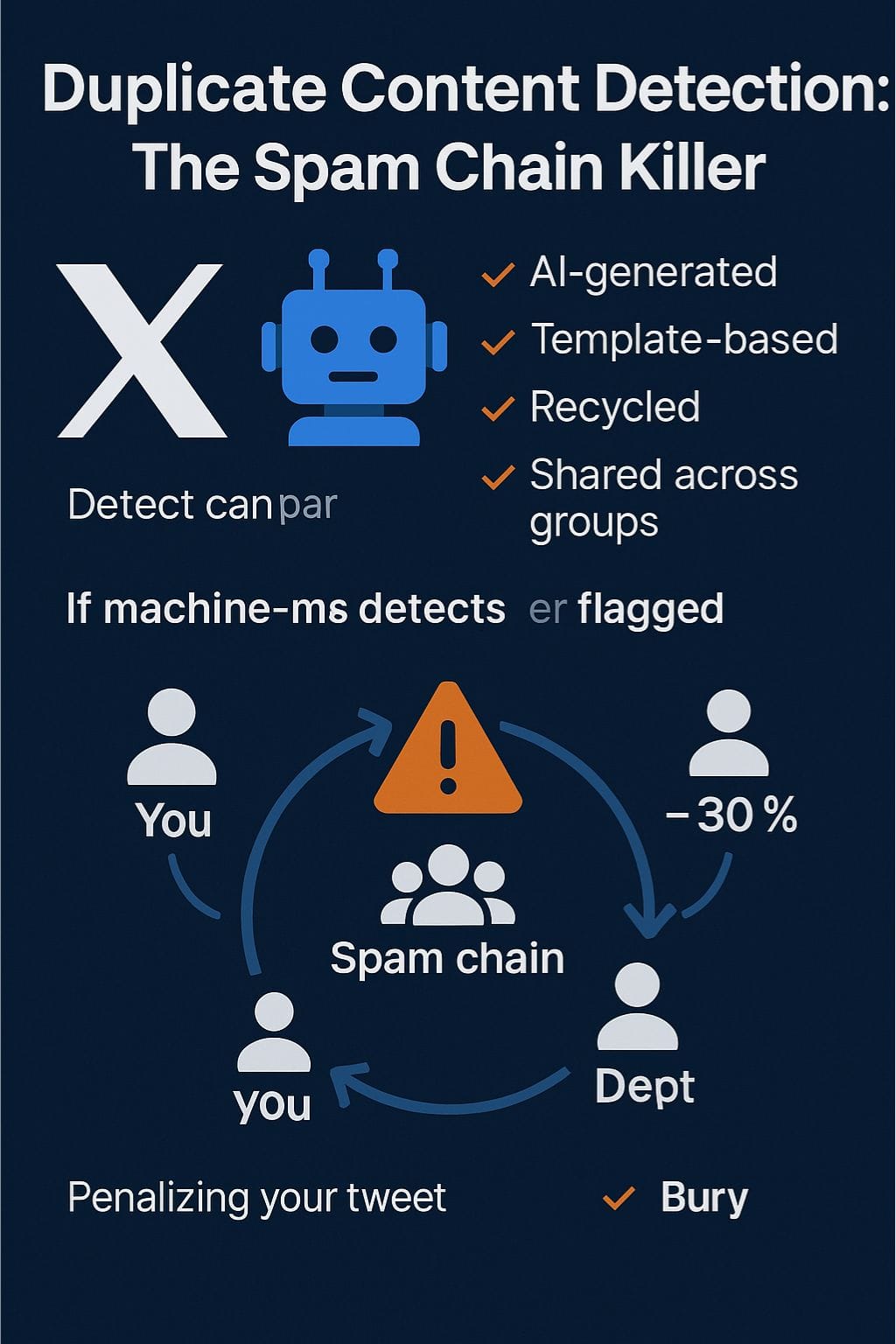
4. Dwell Time Decay: The 3-Second Rule That Can Destroy Your Account
This is the mechanic almost nobody talks about — and it’s one of the strongest.
If a user views your tweet for less than 3 seconds before scrolling,
X records a negative quality signal.
This is known as Dwell Time Decay.
If your average dwell time falls consistently, your account’s global Quality Multiplier drops by 15–20%.
This means:
• Your tweets hit harder algorithmic walls
• You enter lower trust categories
• Your impression potential collapses
This is why certain accounts artificially inflate dwell time using burner accounts, VPNs, or coordinated dwell farms.
The algo sees “independent users reading thoroughly,” and rewards them with:
• Higher distribution
• More visibility
• Stronger initial push
…but their retweets and likes remain awful.
Ever seen an account get 150,000 views but only 12 likes?
That’s dwell farming.

5. What You Should Actually Do (According to Algorithm Logic)
Understanding these systems gives you the upper hand. Here’s how to leverage them:
1. Raise TweepCred fast
• Write a proper bio
• Avoid spammy follows
• Maintain a clean follower ratio
• Write in coherent, consistent language
• Post like the accounts that fill your timeline

TweepCred rewards alignment, not originality.
2. Avoid engagement debt
Your first 100 tweets are critical.
If your account is older: delete low-performing tweets.
3. Build real conversations
Mention major accounts in your niche:
Offer insight
Add value
Show expertise
Make people curious
Curiosity → profile clicks → TweepCred boost → distribution boost.

4. Don’t copy content
Rewrite ideas, don’t duplicate formats.
X knows.
5. Maximize dwell time
Use:
• storytelling
• spacing
• hooks
• visuals
• multi-part insights
• curiosity loops
• open-ended questions
The goal:
Keep users on your tweet longer than 3 seconds.
6. Avoid negativity
Grok now evaluates tone.
Negative sentiment = lower trust classification.
Stay positive.
Stay helpful.
Stay human.
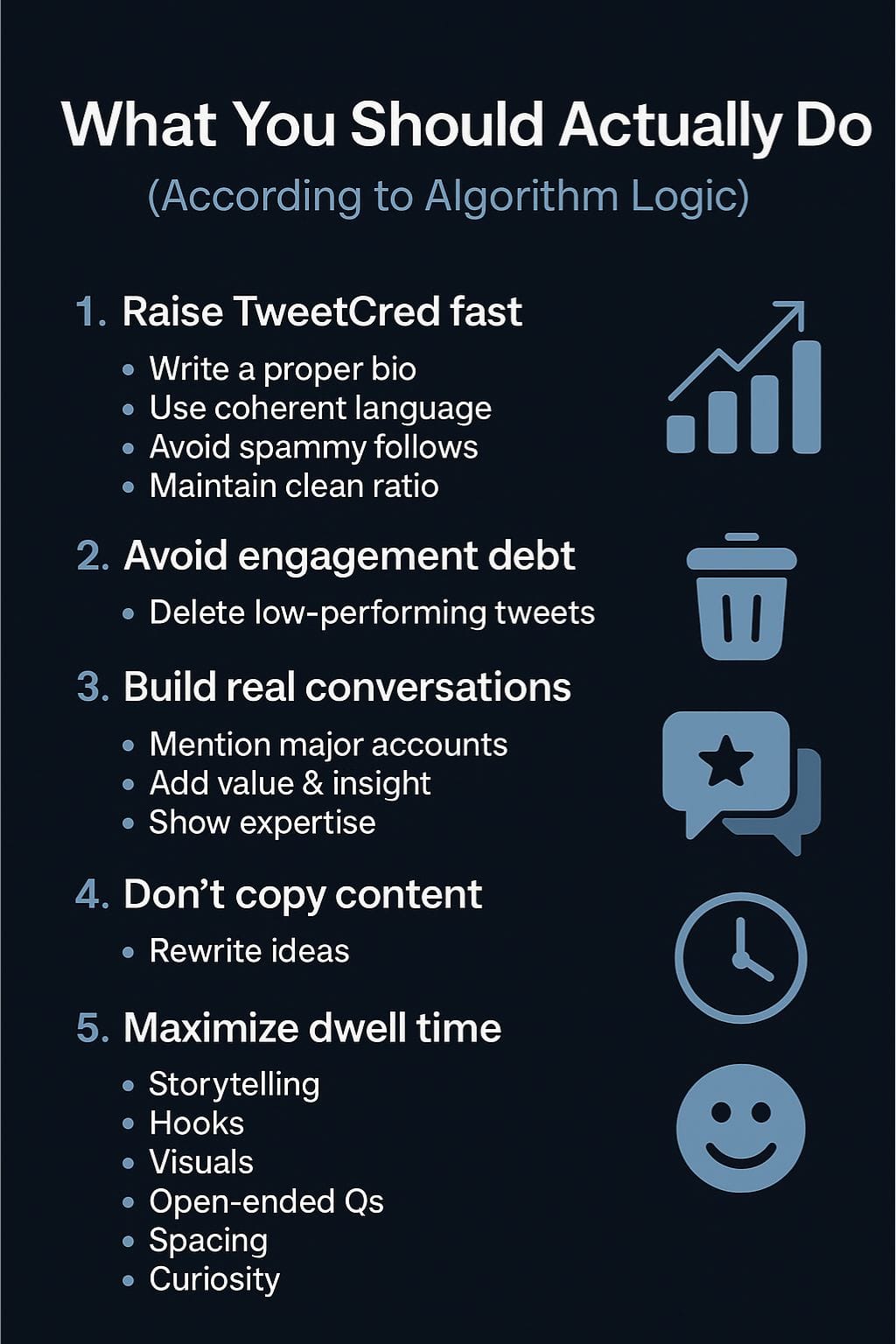
6. Why This Matters More Than Ever
X in 2026 is not the platform of 2018.
It is not time-based.
It is not follower-based.
It is not engagement-based.
It is an algorithm sentiment–based.
Meaning:
The algo doesn’t care who you are.
It cares about how your behavior scores.
Understanding these internal mechanisms is not optional anymore.
It is the difference between:
50 impressions
and
500,000 impressions
Between
“Why does nobody see my tweets?”
and
“What made this go viral?”
You can complain about it…
or you can understand it — and dominate with it.
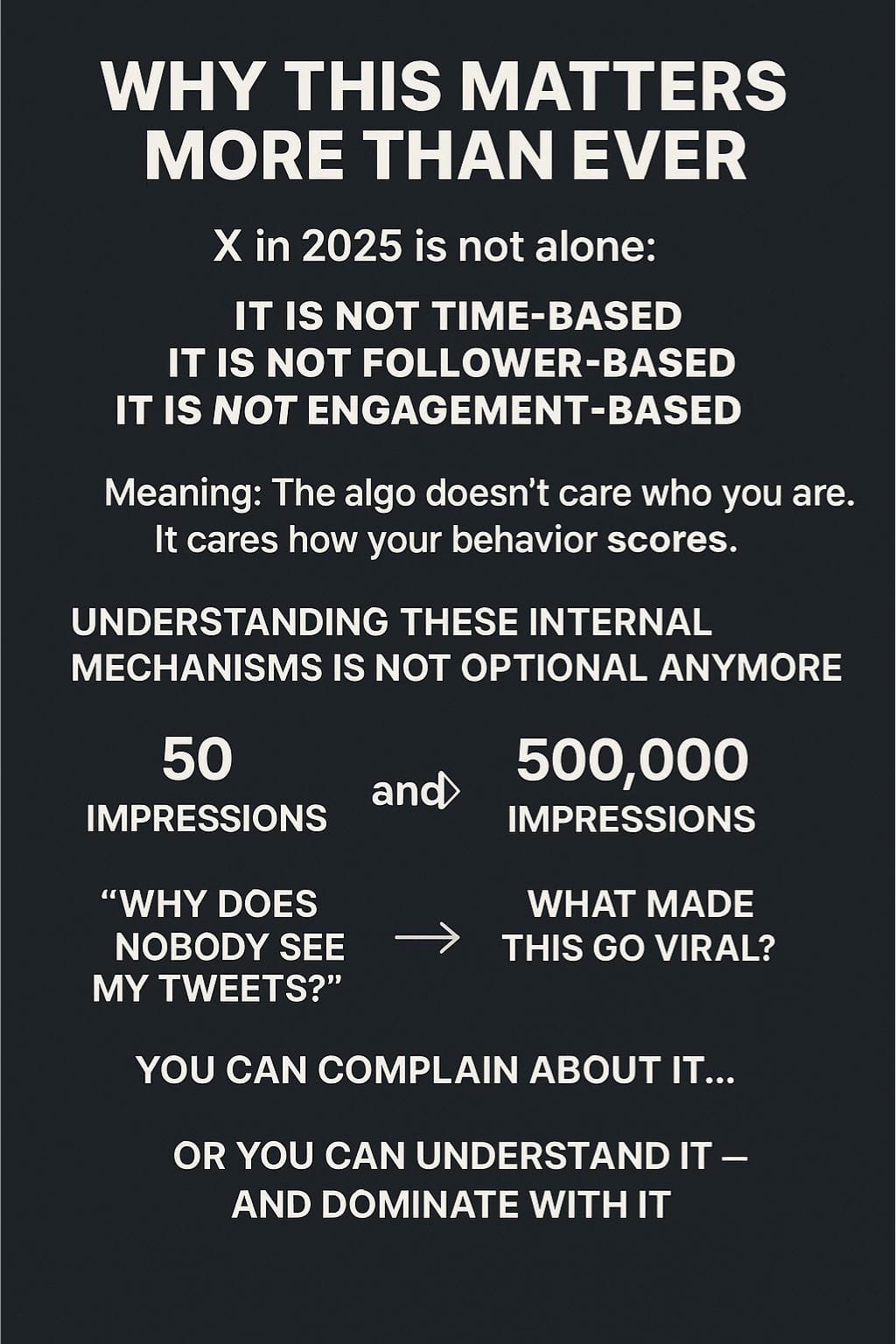
7. How Circleboom Helps You Master TweepCred, Dwell Time & Engagement Quality
Understanding the X algorithm is the first step.
Managing it strategically is the second.
This is where Circleboom gives users a decisive advantage — because while most people guess what improves TweepCred, engagement density, or dwell time, Circleboom applies data-driven, system-level tactics that directly influence the signals X evaluates.
Here’s how Circleboom helps you fix, strengthen, and optimize your account inside the algorithmic framework described above:
A. Repairing TweepCred & Engagement Debt Through Audience Cleaning
One of the biggest killers of TweepCred is low-quality audience composition:
• Bots
• Spam clusters
• Inactive ghost accounts
• Fake followers
• Mass-created profiles
These accounts produce:
– low click-through
– low dwell time
– low engagement
– negative ratio spreads
– high scroll-pass signals
This combination crushes your TweepCred, pushes you into Cold Start Suppression, and deepens your Engagement Debt.
Circleboom fixes this at its core by letting you:
✓ Remove bots & mass-created accounts
✓ Block low-quality clusters
✓ Filter out inactive & ghost followers
✓ Delete suspicious followers harming your score
✓ Rebuild a high-quality audience baseline
A clean audience =
higher engagement density = better TweepCred = algorithmic trust restored.
This is something no posting tactic can fix — it must start with your audience.
B. Increasing Dwell Time with AI-Enhanced Content Strategy
Circleboom’s publishing tools help you create the kind of posts the algorithm wants:
✓ Well-structured text
✓ Curiosity-based openings
✓ Layered, readable formatting
✓ Hook optimization
✓ High-retention tweet structures
These directly boost the 3+ second dwell threshold, which X treats as a strong positive signal.
Because Circleboom can:
• Analyze past high-dwell posts
• Recommend engaging writing styles
• Use historical audience behavior to shape posting patterns
• Suggest optimal tweet structures
…you end up producing content that keeps users on your posts longer — which raises your quality multiplier over time.
C. Avoiding Duplicate Content Penalties
The Duplicate Content Detector punishes “spam chain” posts.
Circleboom’s AI Writer gives you unique, non-template, non-repetitive content every time, reducing similarity patterns that trigger:
• spam flags
• chain penalties
• topic redundancy penalties
This ensures your posts remain algorithm-safe even when covering trending or competitive topics.
D. Timing Optimization ≈ First Impression Multiplier
X measures your “first 5–20 minutes performance” as an early distribution signal.
Circleboom’s smart scheduler helps you:
✓ Post when your real audience is active
✓ Avoid dead zones
✓ Hit peak interaction windows
✓ Increase initial engagement velocity
This improves your early engagement curve, which X uses to decide whether to expand or limit distribution.
E. Eliminating Negative Quality Signals
Trolls, bot replies, spammy interactions — all of these hurt your:
• sentiment score
• conversational credibility
• account reputation
• TweepCred stability
Circleboom’s spam filtering and follower cleanup reduce the amount of low-quality interaction you receive — insulating your account from negative sentiment signals that Grok evaluates.
Clean interactions = cleaner sentiment profile = better ranking.
F. Boosting Curiosity & Profile Clicks (the fastest TweepCred booster)
TweepCred rewards:
• curiosity
• profile visits
• meaningful interactions
Circleboom boosts these indirectly by helping you:
✓ Craft value-based tweets
✓ Publish consistently
✓ Use high-retention formats
✓ Identify best-performing content patterns
✓ Monitor engagement patterns in real-time
More curiosity → more profile clicks → faster TweepCred recovery.
G. Rebuilding a Positive Algorithmic Identity
The combination of:
• high dwell time
• clean audience
• unique content
• consistent posting
• positive sentiment
• real engagement patterns
…creates what the algorithm understands as a “positive identity score.”
Circleboom simplifies this entire ecosystem by giving you:
• Clean, active followers
• High-retention content
• Smart timing
• Engagement density improvements
• No-penalty duplicate-free AI writing
• Spam-free behavioral signals
It is the only toolkit that manages every major input signal used by the modern X ranking engine.
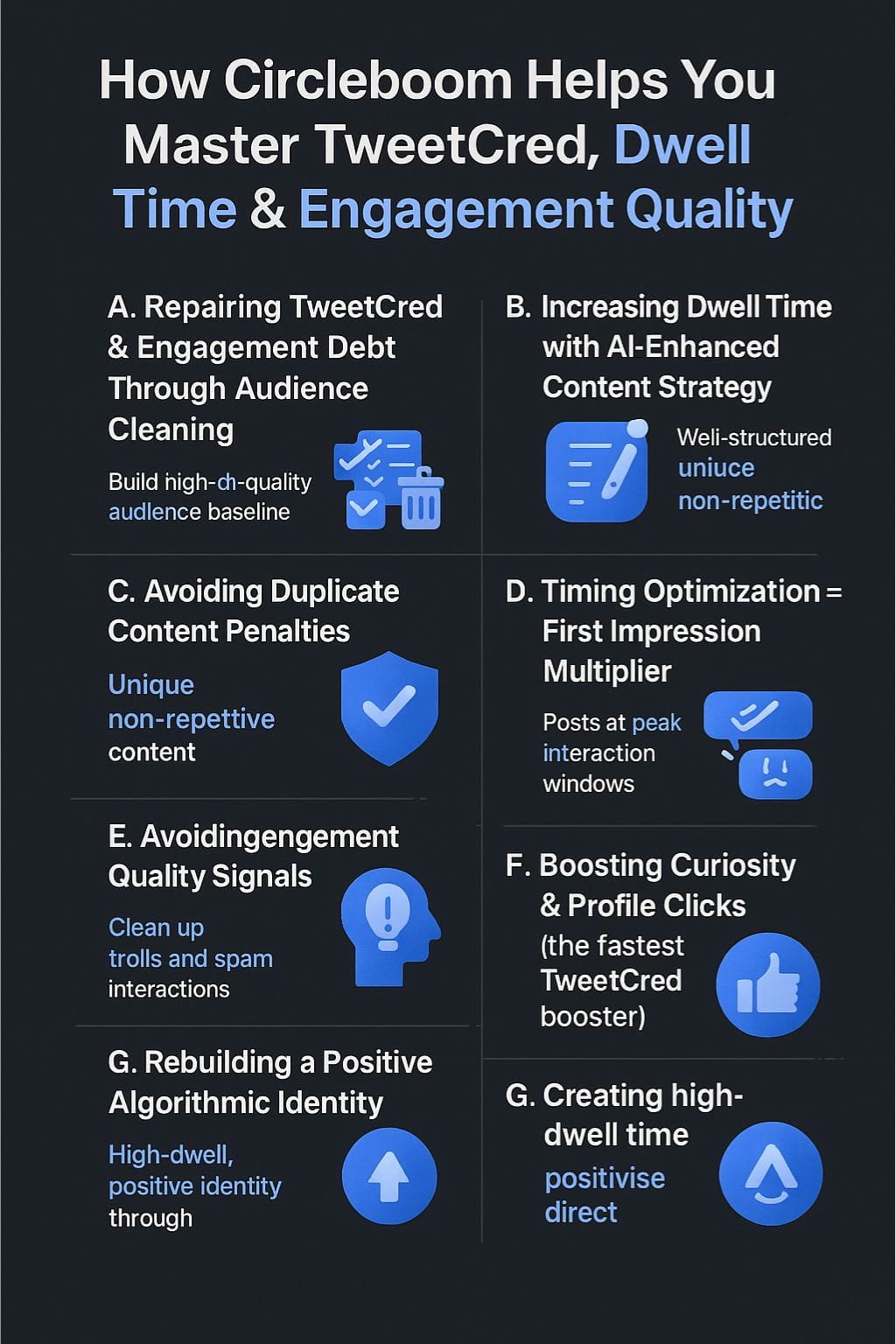
Conclusion: Master the Algorithm, Don’t Fight It
The X algorithm isn’t random, emotional, or mystical.
It’s a machine — a complex network of 30+ scoring systems measuring your authority, your behavior, your audience, and even the way users scroll past your posts.
Most creators fail not because they lack talent, but because they lack signal control.
TweepCred, Engagement Debt, Dwell Time, Duplicate Content Detection — these aren’t buzzwords. They’re the invisible rules that determine whether your voice spreads or suffocates on X.
But here’s the real shift:
You don’t need to “outsmart” the algorithm.
You need to align with it — intelligently and systematically.
That’s where Circleboom becomes more than a tool.
It becomes your algorithmic assistant, helping you fix the signals that hurt you and amplify the ones that matter:
• Clean, authentic audience → Higher TweepCred
• AI-structured content → Higher Dwell Time
• Smart scheduling → Stronger initial velocity
• Unique writing → No duplicate content penalties
• Behavior-safe workflows → No negative sentiment flags
The result?
You stop guessing.
You stop hoping.
You stop posting blindly into suppression zones.
Instead, you operate as the algorithm expects high-performing accounts to operate — with clarity, consistency, and data-backed precision.
The creators winning on X in 2026 aren’t louder.
They’re smarter.
They understand the system behind the feed, and they sculpt their presence accordingly.
Now you have that same knowledge.
And with the right tools, you have the same advantage.
Master the signals.
Shape your algorithmic identity.
Become unignorable.






